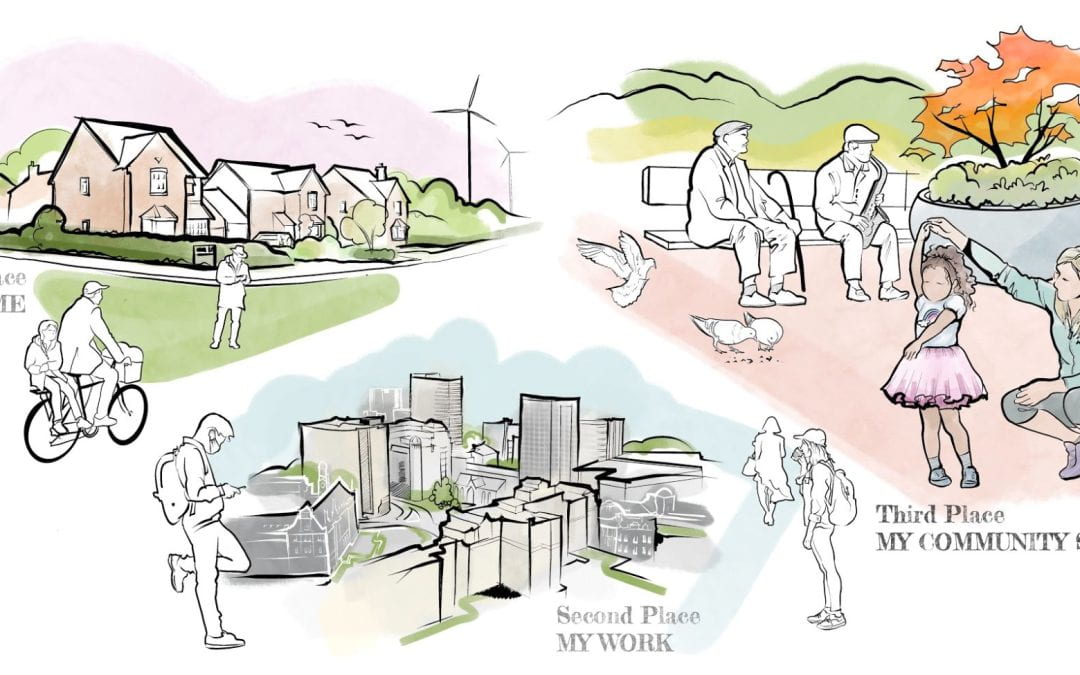Holocaust Survivor Ed Lessing’s Impactful Story Speaks to the Present

April 20, 2023
“We have two ears and one mouth, so we should listen more than we say,” said the Greek philosopher Zeno. In a dark time at Hastings High School, with hate crimes on the rise, we students need to listen. Students need to hear a story that is uplifting and inspiring. The story of Eliazar “Ed” Lessing is that story. Little did I know that for the ten years I have lived at my house on Summit Drive, an incredible man — and story — lay just two streets down. I was lucky enough to sit down with Holocaust survivor Ed Lessing, who at almost 97 years old heartily told me his astounding story. Born on May 8th, 1926 in the Dutch city of the Hague, Lessing had two Jewish parents, neither of whom were very religious. His father and mother, a cellist and telegraphist respectively, decided to immigrate to the USA when Ed was three. In 1932, they ended up moving back to Holland eventually moving to a small town of Delft, and as Lessing told me, “that is where my Dutch history begins for the second time.”
“On May 10th, 1940, two days after my 14th birthday, I woke up early and there was a machine gun firing in the street.” Looking down into the street, Lessing noticed Dutch soldiers firing at planes, all of which had swastikas. Hitler had invaded Holland. Germany eventually took over Holland and German soldiers roved the streets. “It did not bother anybody very much seeing German soldiers because they knew Holland was not the ultimate goal, London was.” Indifference regarding the Germans, despite Jews being put in concentration camps in Germany, stemmed from Holland’s longtime religious freedoms. “The Dutch Jews, having lived in freedom, very good freedom, for 100 years or so, thought that the Germans would never do that to the Dutch Jews,” Lessing said.
Nazi Germany soon instituted antisemitic laws in Holland that restricted Jews from many of their personal freedoms, which Lessing told me “hit my parents more than it hit me. I was just a teenager going to school.” Eventually, there came a new regulation that forced Jews to go to their town hall and register as a Jew. “We Dutch Jews who had lived in freedom didn’t see anything so bad in it, so my parents went to the town hall. We did not realize that it was the noose around our necks,” Lessing said. Shortly after this regulation, the Nazis had a plan to send all Jews on trains to a place where they would “work” and refusal to get onto the train would result in their death. “My father said, ‘Well I work hard here, what’s wrong with going to another place and working hard there,’” Lessing recalled. In 1942, his family was all prepared to get onto the trains until Lessing’s grandfather from Amsterdam strongly advised them not to. “He said if we went on the trains he would never see us again.” At first, Lessing’s parents could not fathom the idea that someone would put them on a train to kill them, it seemed senseless. In the end, his parents decided not to go on the trains, opting to go into hiding instead.
“It was October 1942, one morning we walked out of our home and walked to a suburb of Delft.” There, Lessing told me, they found two friends who let them stay there as a temporary hiding place. “This is where my mother became the hero,” Lessing said. It was his mother who was able to make contact with a Dutch resistance group, create a new identity for herself, and find each of her family members a place to hide. “That is how my family exploded,” Lessing told me. Lessing’s first place of hiding was with two older women, a spot he knew was temporary.
Lessing’s mother was able to get away with her false identity card — which depicted her as non-Jewish person — for a while. She was able to ride on Dutch trains multiple times a month, an especially dangerous activity since they were constantly checking for Jews until one day, a policeman stopped her in the street. He immediately recognized that Lessing’s mother’s identity was fake. “She thought that was the end of her,” Lessing told me. It turned out that that policeman was a member of the Dutch resistance group who informed Lessing’s mother that she needed a new false identity card since hers was not good enough. That same policeman was made aware of Ed’s situation and he immediately suggested putting him on a small farm in the Holland countryside to pose as a Christian. In order to no longer look like a typical Dutch Jew, Lessing had his hair bleached blonde. Once he moved to the farm he was put to work, all while sleeping in a loft with hay and other extra food. “I made myself comfortable and started to work…I learned a lot,” Lessing told me.
“Terribly lonely” and “deeply afraid” were Lessing’s feelings at the farm. The fear stemmed from the fact that anyone who passed by the farm could have been a German spy, marking the end of his life. That angst, combined with the absence of family around him, put Lessing in a dark place. “I got very depressed. It was so different from any other situation I had been in in my life,” Lessing remarked. One day, to inform her of his issues, Lessing met up with his mother secretly a couple miles from the farm. “I said ‘I can’t do it anymore. I cry my eyes out every night.’” Lessing even went as far to say to his mom that he wanted to give himself up to the Germans. Lessing’s mother, not wanting him to commit suicide by revealing his true identity to the Nazis, went back to the policeman. Ed was able to meet up with the policeman who took him aside and informed him of a new location where he could hide, stressing that there was “no guarantee that you will survive.” Lessing, with the mindset that anything would be better than living on the farm, followed the policeman to his new spot. Lessing followed the policeman into the middle of woods, and Lessing was confused at first, as all he saw was undergrowth. The policeman then picked up a huge pine tree which revealed a path that led to a cabin filled with six men: it was the headquarters of a Dutch resistance group. “He told me that if the Germans ever find us ‘that’s it,’ and asked me if I wanted to stay.” Lessing stated that it was a very difficult decision: Holland is a small country and with so few places to hide, it was a risky location to choose. Lessing decided he would assume the risk, beginning the next chapter of his life.
One early December morning in 1944, two weeks after a false alarm, the alarms in the cabin went off again signaling a possible threat of Germans. Lessing and his friend, Herman, were assigned to hide in the woods by the main road to watch for Germans. That mild December day they sat there, in the dark, smoking cigarettes when they heard traffic coming up the road. It was German trucks. They recognized the wartime headlights and Herman advised Ed to run back to the hut to inform the others of the invasion. Lessing stormed into the cabin full of sleeping men shouting that the Germans had arrived, which Lessing described as “pandemonium.” “Some were tired and confused, some were crying,” he said. Ed then met up once again with Herman at a meeting spot not too far from the hut and waited.
“There we stood in the pitch dark, behind the trees, guns in our pockets, waiting to see if other men would come.” All of a sudden a noise came out of the dark woods, it was someone coming on a bike. “We thought it must be a trick from the Germans” since they believed that the Germans had found them. “It was silent, the person got off the bike and stood there…we got our guns out and waited,” Lessing said. After much waiting, they slowly walked up to the dark figure and pointed a gun at the person shouting and confronting them. “A voice, a woman’s voice, said ‘don’t shoot me, it’s me Ed’s mother.’” Ed’s mother had heard about the raid on the hut and miraculously found her son, another spectacular example of her courageousness.
Ed’s mother gave Herman her bike so he could find a safe place to hide, leaving her and Ed alone in the dark woods. “My mother, as always, had a plan,” Lessing said. She led her and her son down a narrow path through the dense woods walking a half a mile until they saw a German soldier, hoisting a gun pacing back and forth. Lessing’s mother immediately began her perilous plan. They put their arms around each other and started to talk very loud, laugh, and make kissing sounds while walking right up to the soldier, who confronted them. As he angrily asked them who they were, Lessing and his mother happily greeted him saying that they were a new, happily engaged couple. The soldier believed them and they were able to get past him to, as Lessing said, “have another day of life.”
That heroic act by his mother, Lessing explained, “in essence ends my holocaust story.” Lessing then worked on different farms as he waited for the war to end. On the other side of Holland, Lessing’s mother was caught on a Dutch train with her false identity card and she was arrested and eventually sent to the concentration camp Bergen-Belsen, the same camp where Anne Frank died. With his mother gone, Lessing told me he was determined to find his father and brothers. “I had heard about a place about 20 miles away where my mother had spent a little time, and I thought maybe that was where they were,” Lessing explained to me. Lying to the farmer that he was visiting his sick uncle, Lessing peddled off in search of his family. He arrived at the suspected address and there they were, his father and brother, the family he had missed dearly and hadn’t seen in years.
Lessing lived with them during the winter of 1945 when one day, they heard guns going off in the town. Hiding in a hole they had dug, Lessing and his family survived the attack and when they came up, were greeted kindly by Canadian soldiers. “We were liberated by Canadian soldiers and life began back in Delft,” Lessing said.
As “normal” life began again, Lessing’s mother arrived back to Delft. She had escaped the concentration camp, a story Lessing said “could fill a whole other article.” As Lessing came to a conclusion of his story, I sat there speechless. The melancholic yet triumphant story brought me hope, and I immediately knew this was a story the students of Hastings High School needed to hear.
As we wrapped up our time together, I informed Lessing of the rampant hate crimes in the Hastings school district and he was utterly shocked. Lessing commented that the antisemitism not just at Hastings but throughout the country “makes no sense.” “It is absolute idiocy to attack people who just had six million of them murdered,” he exclaimed, then saying, “I can’t even feel it as something rational — it is not a rational hate.” Suffice to say, Lessing, like many others in Hastings, is disgusted by these hate crimes.
I would like to thank Eliazar “Ed” Lessing for taking time out of his day to sit down with me and tell me his incredible story. Ed was nothing but hospitable and kind, and I believe his awe-inspiring story will touch the hearts of many.

















